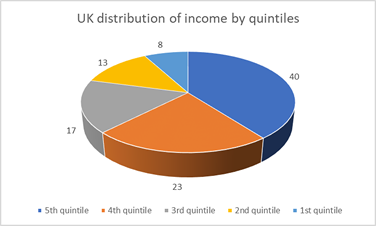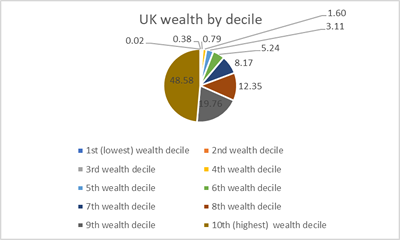What is the distribution of income?
The distribution of income is how total income is spread across the population. This in turn tends to have a lot to do with the distribution of wealth. While income is the reward received for the use of a factor of production
wealth refers to the stock of assets a person, group or country has. Because assets can often be used to generate income, the fact that wealth is unequal, contributes to the inequalities seen in people's incomes.
Income and wealth
| Type of income |
Description |
| Wages/Salary |
A wage or salary will be the reward for providing labour. Higher skilled, higher paid jobs are more likely to be paid a salary that will be a yearly amount paid monthly. Wages are more common in low skilled jobs and are
often paid weekly or fortnightly based on the number of hours worked. |
| Rent |
When we say rent the first thing we think of is rent for buildings and people that own extra houses or firms with extra office space can rent it to make additional income. However rent is not limited to buildings. Large
machines, cars and other assets may also earn rent income. |
| Interest |
This is the reward for having money in financial investments. For financial firms it is also a way for them to get income by issuing loans and charging interest. |
| Profit |
Profit is when a firms revenue exceeds its expenditure for the year. Profits provide a valuable source of income for firms that they can be used to improved the firm or taken as income by the owners. |
| Benefits |
People who do not have any other form of income are entitled to benefits which is a basic wage to cover the cost of living. Benefits pay less than having a job with a wage. Retired people are also entitled to a pension from
the government and the long term ill will be entitled to payments as well. |
In the UK the top 20% of earners earn 40% of all incomes while at the other end the bottom 20% earn just 8% of all income.
 UK distribution of income as per ONS 2018
UK distribution of income as per ONS 2018
The different types of wealth an individual might have also lead to more income.
| Type of wealth |
Description |
Income from it |
| Assets |
These are material possessions like houses, cars, furniture, electronics etc. |
Certain assets like houses can earn rent. Some assets appreciate in value which will mean income when they are sold. |
| Savings |
Some people have savings in the form of cash. |
Additional cash can be deposited with the bank to earn interest. |
| Shares |
Shares represent partial ownership of a company. |
People who have shares may receive a dividend from them. This is when a firm decides to pay profits out to owners. If they retain them the value of the shares will likely go up and people would have to sell
them to gain extra income. |
In the UK wealth is a lot more unequal than income. The top 10% of wealth holders have over 48% of all wealth while the bottom 40% have less than 3% of all wealth between them.
 UK distribution of wealth as per ONS 2020
UK distribution of wealth as per ONS 2020
Evaluate the causes of differences in the distribution of income and wealth
There are a range of factors that affect the equality of income distribution.
| Factor |
How it affects the distribution of incomes |
| Inequal distribution of wealth |
The fact that some people have access to income generating wealth and others don't means those people are likely to have higher incomes. |
| Age and gender |
Younger workers tend to earn less than more experienced workers who are rewarded for their greater experience and more likely to be in senior roles. Once retired, income is low for most again. Despite years of effort to
change things there is still a fairly large gender pay gap with women earning on average less than men. |
| Types of jobs |
Different jobs pay different rates. Generally speaking higher paid jobs will require more qualifications and experience. People with a low level of education will likely have to work in low paying jobs. |
| Those reliant on benefits |
The unemployed, long term ill and pensioners that do not have access to other savings will all rely on state benefits which will be a low level of income. They will be unlikely to be able to save to generate assets for future use. |
There are a number of reasons why wealth is unequally distributed.
| Factor |
How it affects the distribution of wealth |
| Inheritance |
When someone dies they can pass on their wealth to their family through inheritance. The government places a tax on inheritance above a certain amount. This is aimed at reducing the inequalities of wealth. |
| Savings |
Those on the lowest incomes struggle to meet all their costs and do not have money left to save. Over time the wealth gap between low paid and higher paid workers grows. |
| Property |
Those with enough income may be able to purchase their property or even additional investment properties. Investment properties can generate rent income while in general the value of property increases over time
meaning those that can afford to get a loan and buy their own home will grow their wealth. |
Evaluate the consequences of differences in the distribution of income and wealth
When there is a big gap between what the poorest earn and what the average person earns there is a risk of poverty. Absolute poverty is not having the essential food, clothing and shelter to survive but there is also relative
poverty when people have a low standard of living and may not have access to many of the things people generally take for granted.
Poverty often leads to poor quality housing and poor health. Often the quality of public services in deprived areas is weak. Poverty and deprivation can often be regionalised and those in these areas have fewer opportunities
to improve themselves.
These issues are often larger in developing nations who may not have well developed systems of state benefits and may not be able to afford to implement them. However, even in developed nations poverty and deprivation still exists.
Governments strive to improve this with their policies.
Exam style questions
Use the space below each question or a pen and paper to write your answer. When complete click the button for the answer and mark scheme.
NOTE: Answers typed into the browser will not be retained if you leave the page or refresh
Questions
Explain the difference between income and wealth. (2 marks)
Income is the reward for the services provided by a factor of production, most commonly labour(1) and wealth is the stock of personal assets a person has.(1)
Other than wages, state two other types of income. (2 marks)
Any two from: Rent, interest, profit, and benefits; 1 mark per answer. Mark only first two answers given.
Explain what is meat by the distribution of wealth. (2 marks)
The way in which wealth is shared(1) amongst the population of a country.(1)
Explain what inheritance is. (2 marks)
When a person dies(1) and they pass on their wealth to people in their family.(1)
Case study/Scenario
In the UK incomes are quite inequally distributed with the top 20% of earners earning 40% of all income. Meanwhile the bottom 20% earn just 8% of total wages. When it comes to wealth things are even more inequal. Here the top 10%
of people have over 48% of the wealth while the bottom 50% of people combine to have less than 6% of the nations wealth.
Evaluate the reasons for the inequality of incomes in the UK. (6 marks)
Sample answer:
A key reason for different incomes is the fact that different jobs.{AO2} This is because a job with low skills will have a large supply of workers that can do it leading to a lower equilibrium wage and a
job with high skills will have a lower supply of candidates and pay more.{AO3a} While a more skilled job pays higher, access to this is dependent on your level of education and education is often worse in deprived areas.{AO3b}
An inequality of wealth i.e. income producing assets, means some people earn income from assets they own while others earn none.{AO3a}. So the level of wealth of an individual affects their income and much wealth is passed down
from generation to generation through inheritance.{AO3b}
Both of these factors contribute to the inequality of income but to know for sure which is the most important you would have to look at how much income is in the form
of wages and how much from other forms of wealth.{A03b}
Evaluate the consequences of the inequal distrubution of income and wealth for the UK. (6 marks)
Sample answer:
Inequalities of income and wealth can lead to poverty where people don't have everything they need to survive.{AO2} In the UK absolute poverty where people do not have the basics of food shelter and clothing is rare
but homelessness does still exist{AO3a} but for most the experience would be relative poverty where people can't afford some of the basic things others take for granted.{AO3b}.
Inequalities of income and wealth lead poorer
households to group together. These areas often lack good services like high quality schools that allow people to lift their living standards.{AO3a} Therefore, the chance to improve is dependent on the schools available in your
area.{AO3b}
Probably the most important issue is addressing all issues of absolute poverty as it can mean life and death and then addressing the quality of services available to help people lift themselves up.{AO3b}
<< Previous: Low unemployemnt Next: Price stability >>